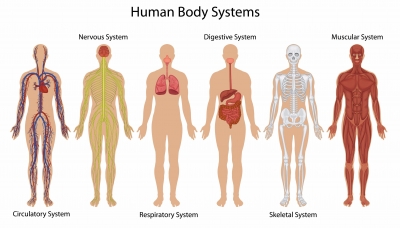
Humans could not survive without all 12 of the body systems – groups of body parts that carry out different tasks. The systems communicate continually by passing instructions to each other, so the body works as one.
The 12 systems are the skin, hair and nails, muscular, skeletal (bones), nervous (brain and nerves), cardiovascular (heart and blood), lymphatic (drainage), immune (defence), respiratory (lungs and breathing), digestive (processing food), urinary (kidneys and bladder), reproductive (sex), and endocrine (hormones) systems.
Working together
Body systems are interdependent, which means they rely on each other to function. Some organs belong to more than one system – the pancreas plays a role in digestion but also releases hormones, so it belongs to both the digestive and endocrine systems.
Picture Credit : Google

